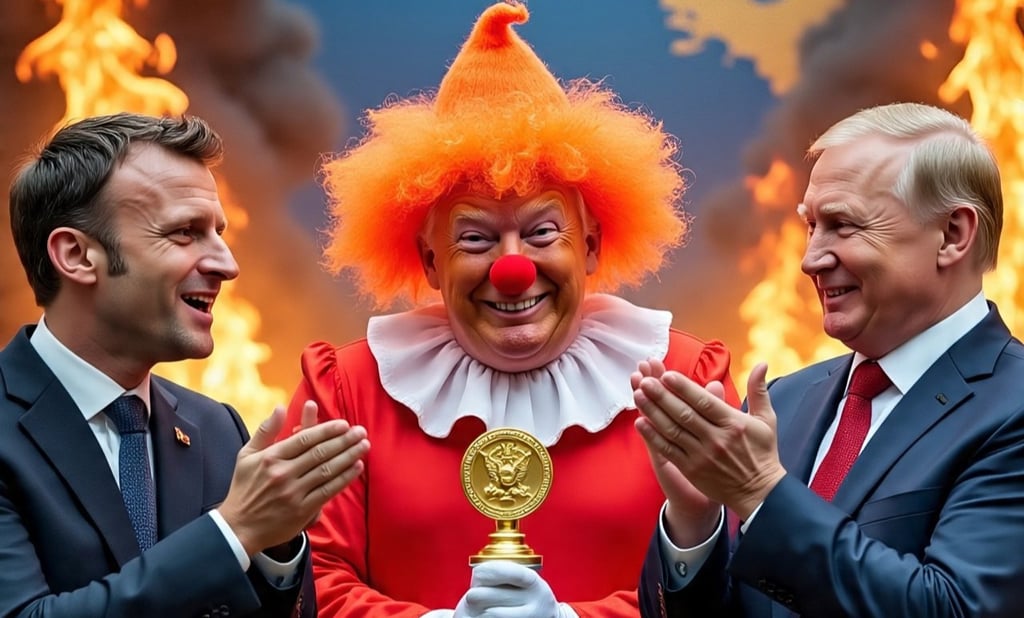Nobel Dream: Will Trump Turn the World Upside Down?
This article examines Donald Trump’s role in global conflicts, his personal ambition to win the Nobel Peace Prize, and the impact of his personality and showy style on U.S. policy and its allies, while reviewing the potential strategic risks for Europe and the West.
Bilal Nour Al Deen
8/26/20252 min read


Wherever wars erupt, U.S. President Donald Trump appears. He calls his fellow world leaders, meets others at the White House, and sometimes brings warring heads of state together, pushing them toward signing peace agreements. His personal ambition is clear: to win the Nobel Peace Prize before the end of his life. Perhaps his efforts to end the Russia-Ukraine war serve this goal. Yet the question remains: Does Trump approach conflicts strategically, or could his personal ambitions jeopardize major interests?
Currently, three leaders dominate the scene: Vladimir Putin, Donald Trump, and Volodymyr Zelensky. Trump presents himself to Americans and the world as a negotiation expert capable of overcoming obstacles and opening communication channels between rivals. Yet his showy style creates strange, sometimes shocking, even cartoonish, scenes. He once summoned Zelensky to the White House to humiliate him in front of cameras alongside his deputy before requesting consent to halt the war. On another occasion, he invited Putin to a meeting in Alaska amid a display of B2 bombers, as a show of authority. At these moments, the world seems like a circus with real estate mogul Donald Trump as the ringmaster.
Trump’s Personality and Its Impact on Policy
What is concerning is that Trump’s personality may hinder his understanding of the real causes of the conflict. For Putin, Ukraine is not just a temporary bargaining chip but an opportunity to expand Russian influence and weaken the Western framework established since the end of the Cold War. Ignoring this reality could harm the United States and its allies, particularly Europeans, in the long run.
From Rhetoric to Realpolitik
Trump must acknowledge that Putin will not back down, no matter the cost of the war. The danger lies in failing to act realistically, potentially repeating mistakes from his first presidency. A reckless personality may lead to erratic moves, whereas diplomacy requires experience and planning to mitigate damage. In other words, rushing to appease Putin may freeze the surface while the depths boil, producing severe effects on the Western bloc that may not appear for years.
Trump’s desire to end the war is understandable, as he wants to shift attention to the conflict with China. But miscalculations may make the clamor of battles in Ukraine preferable to a false calm that results in a strategic defeat. The coming days will reveal the consequences.
Dealing with Europe as a Model
For decades, the United States built its presence on strategic alliances worldwide, enhancing its interests and giving allies standing. Yet Trump’s current approach seems detached from this traditional strategy. He sees NATO as a financial burden and European countries as economic competitors, like China. These views do not promote peace and may create new enemies.
Continuing such policies could weaken trust between the U.S. and its allies, pushing friends to redirect trade and alliances toward Asia or other regions. It also grants Russia influence it has long desired, giving Putin strategic gains even without territorial expansion.
It is clear that flashy decisions and hasty steps may backfire. The world needs precise diplomacy and political experience—not mere impulsiveness—to avoid strategic risks that could last years and reshape the world as we know it.
Contact me via email
SUBSCRIBE TO MY NEWSLETTER
hello@bilalnouraldeen.com
© 2025. All rights reserved.